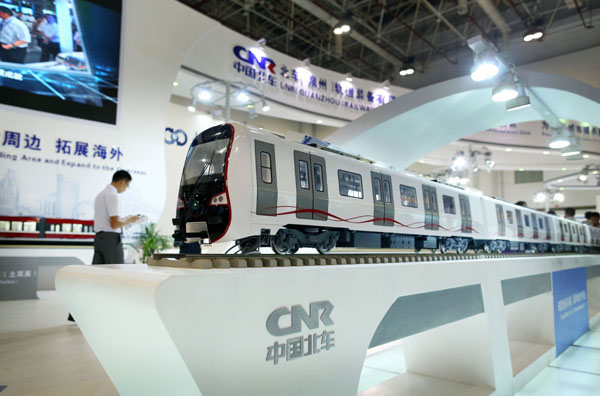 |
|
CNR Corp Ltd's stand at the 18th China International Fair for Investment and Trade in Xiamen, Fujian province, on Sept 8, 2014. [Provided to China Daily] |
CHANGSHA - The outstanding reputation of China's high speed rail (HSR) industry not only shows the success of domestic innovation but also represents a shift from the export of mass produced "Made in China" products.
China North Railway (CNR) and China South Railway (CSR) are industry pioneers, having developed faster, cheaper, cutting-edge services that have attracted worldwide attention.
As an advocate of Chinese HSR, Premier Li Keqiang actively champions the sector while overseas, saying that Chinese HSR technology ensures cost effective projects without sacrificing quality.
Rising quality
In 2014, CNR and CSR signed overseas contracts worth over $6 billion, up 60 percent year on year.
A contract for 284 subway trains, worth 4.1 billion yuan ($6.71 million), for Boston MBTA's red and orange subway lines, was sighed by CNR on Jan 26, which was China's first foray into the US rail transit market.
The trains are designed to travel at 102 kilometers per hour and up to 129,000 kilometers a year on regular maintenance for at least 30 years.
CNR will also set up a R&D base in the the United States, which will create employment opportunities for the local market.
Long Guzong, chief designer of CSR's major subsidiary, said the first HSR export of 12 locomotives to Iran in the late 1990s, was, for him, one of the sector's most impressive achievements.
"We were worried that we might encounter problems with this first export contract] but the high production quality meant the contract was a success, and this made us confident."
Ding Rongjun, a senior mechanic with CSR, said the company holds the rights to the majority of rail track hauling and steering technology, showing CSR values innovation as much as manufacturing.
Going global
China's HSR is going global, thanks, in part, to President Xi Jinping's Belt and Road Initiative.
On Dec 30, 2014, CNR and CSR announced their intention to merge into a new entity.
The merger has passed reviews by the economic planner and securities regulator, and scrutiny by foreign countries' antitrust bodies.
